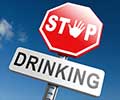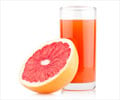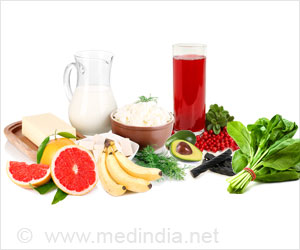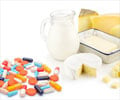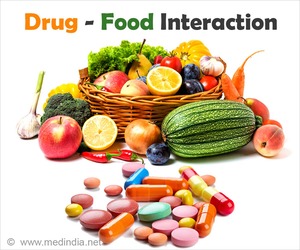- Alcohol Facts - (http://www.druginfo.adf.org.au/drug-facts/alcohol)
- Alcohol and Medication Interactions - (https://pubs.niaaa.nih.gov/publications/arh23-1/40-54.pdf)
- Alcohol-Medication Interactions - (http://www.alcoholscreening.org/learn-more.aspx?topicID=8&articleID=37)
- Harmful Interactions Mixing Alcohol with Medicines - (http://www.stjoeschelsea.org/harmfulinteractionsmixingalcoholwithmedicines)
About
Alcohol is a essentially a depressant drug that can reduce a person’s ability to think rationally. Alcoholic drink or alcoholic beverages usually refers to drinks such as beer, wine or spirits that contain ethyl alcohol (such as whiskey, vodka, rum or gin - commonly referred to as alcohol).
Short and long term side effects of alcohol include:
- Depressing the central nervous system, thus dampening the brain activity
- Chronic diseases such as liver cirrhosis, pancreatitis, cancer, psychological disorders
- Damage to the fetus in pregnant woman that can cause fetal alcohol syndrome, premature births and fetal anomalies.
Absorption, Distribution and Metabolism of Alcohol in body:
Absorption in blood stream
When alcohol is ingested, it is absorbed into the blood stream, and then rapidly distributed to all parts of the body, including brain, within a few minutes. The rate of absorption depends on a number of factors, including:
- Sex
- Body size
- Age
- Genetics
- Individual metabolism
Distribution in the body
Alcohol that has not been eliminated by first-pass metabolism enters the systemic circulation and is distributed throughout the body.
Metabolism in the liver
Metabolism of alcohol take place primarily in the liver, where it is converted to a non-toxic substance. The liver can only metabolize a certain amount at a time, leaving the excess circulating throughout the body. Thus, intensity of alcohol effect on the body is directly related to the amount consumed.
Effects of Alcohol on Drug(s)
Alcohol often has detrimental interactions with prescription medicines, Over the Counter (OTC) products and even herbal products, which could be dangerous and life threatening. These interactions can affect the availability of drug at site of action, by altering the drug metabolism, which could result in serious effects. The extent of interaction(s) vary with the quantity of alcohol consumed and the time gap between alcohol and medication consumption.
The risks or danger associated with these alcohol-drug interactions include internal bleeding, heart problems and difficulties in breathing.
Women and older people are at higher risk of harmful alcohol-drug interactions.
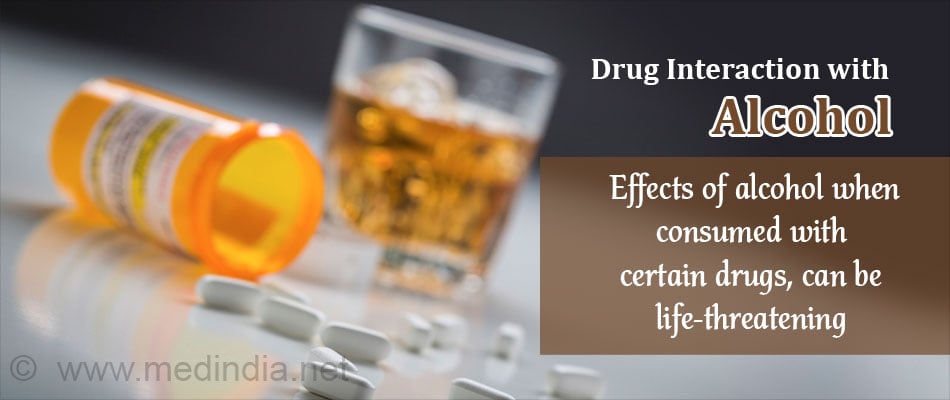
What are the Common Drug Interactions with Alcohol?Alcohol and Alcoholic Drinks:
People who consume alcohol, in small or large quantities, are likely to take medications, at some point. A large number of medications have the potential to interact with alcohol. Hence, it is important to be aware of the alcohol-drug interactions.
Typical alcohol-drug interactions include the following:
- Alcohol, like some drugs, can make one feel sleepy or lightheaded. Drinking alcohol while taking medication can intensify these effects. The person may have trouble concentrating or performing mechanical skills
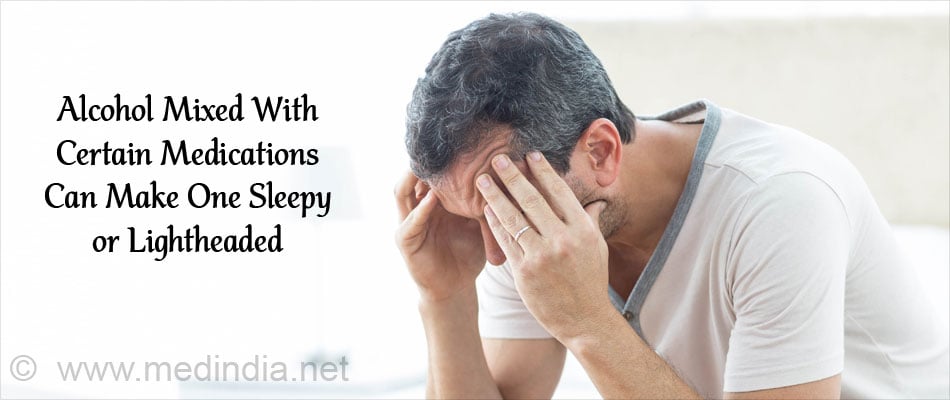
- An acute dose of alcohol (a single drink or several drinks over a short time) may inhibit a drug's metabolism by competing with the drug for same set of metabolizing enzymes. This interaction prolongs and enhances the drug's availability, potentially increasing the risk of experiencing harmful side effects from the drug
- In contrast, chronic (long-term) alcohol ingestion may activate drug-metabolizing enzymes, thus decreasing the drug's availability and its desired effects.
List of Drugs and their Interactions When Taken With Alcohol
| Medication | Category | Conditions | Possible Reactions |
| Loratadine | Anti-histaminics | Allergies/Colds | Drowsiness, dizziness, increased risk for overdose |
| Hydroxyzine | |||
| Chlorpheniramine | |||
| Isosorbide | Cardio-vascular drugs-Nitrates | Angina / Coronary heart disease | Rapid heartbeat, sudden changes in blood pressure, dizziness, fainting |
| Nitroglycerine | |||
| Amphetamine/dextro-amphetamine | CNS stimulants | Attention deficit hyperactivity disorder (ADHD) | Increased risk for heart problems |
| Dextromethorphan | Anti-tussive | Cough | Drowsiness, dizziness, increased risk for overdose |
| Clomipramine | Tri-cyclic Anti-depressants | Depression | Increases the risk of sedation and a sudden drop in blood pressure, when a person stands up |
What are the Effects of Alcohol on Each Drug Class?
The effect of alcohol on some drug classes are given below:
Statins and Alcohol:
Statins are cholesterol reducing drugs, e.g. Rosuvastatin.
Statins and alcohol, each of these, are associated with liver damage. Drinking alcohol can also raise cholesterol levels. Thus, consuming alcohol with statins not only increases the risk of liver damage, but also reduces the efficacy of statins, in reducing cholesterol level.
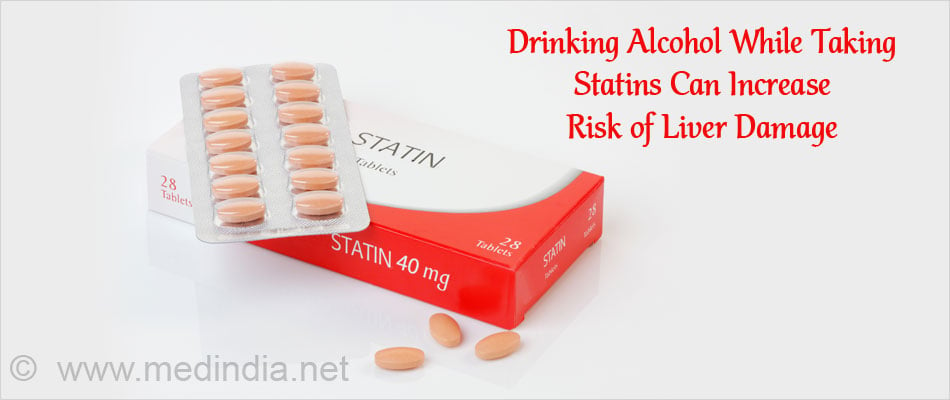
Antibiotics and Alcohol
:Effects of alcohol on antibiotics vary with the type of antibiotic; for example, the antibiotic
- Erythromycin may increase alcohol absorption
- Anti-tuberculosis drug Isoniazid can cause liver damage
- Metronidazole or Tinidazole may cause nausea, vomiting, flushing, headache and irregular heartbeat
- Co-trimoxazole (also called Trimethoprim and Sulfamethoxazole) - Drinking large amounts of alcohol with co-trimoxazole can cause a reaction similar to that seen with Metronidazole or Tinidazole
Anti-depressants and Alcohol: Anti-depressants and alcohol exhibit different types of interactions, depending on the type of anti-depressant being consumed.
- Amitriptyline - Alcohol appears to interfere with first-pass metabolism of amitriptyline in the liver, resulting in increased Amitriptyline levels in blood.
Non-narcotic pain medications and Alcohol: Several potential interactions exist between alcohol and painkillers, which vary with the type of pain killer; for example,
- Acetaminophen and alcohol interaction leads to increased risk of acetaminophen-related toxic effects on the liver
- Aspirin (Acetyl salicylic acid) and alcohol interaction leads to stomach upset, bleeding and ulcers
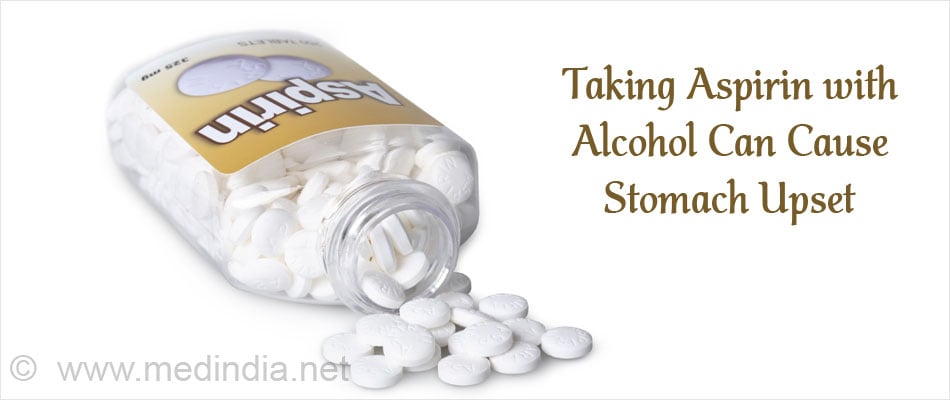
Sedatives / Hypnotics and Alcohol: Medications under the category of Benzodiazepines, e.g. Diazepam, are generally prescribed to treat anxiety and insomnia, also known as sleeping pills. These medications may cause severe drowsiness in the presence of alcohol, thus increasing the risk of household and automotive accidents.
Medications for Cold and Alcohol: Many cold and sinus medications include combination of Pseudoephedrine and a pain reliever such as Aspirin or Ibuprofen, to provide relief from headache or body ache that accompany allergy or cold symptoms. Although Pseudoephedrine and alcohol interactions are minimal and not considered dangerous, combination of Pseudoephedrine and Aspirin (or Ibuprofen), with alcohol, may cause gastro-intestinal bleeding or liver problems.
Anti-hypertensives and Alcohol: Alcohol is known to cause an elevation in blood pressure. Hence, blood pressure medication and alcohol interactions must be closely watched in patients diagnosed with high blood pressure.
Over-the-counter (OTC) and Alcohol: (OTC) products are non-prescription medications and widely used. Some OTC products, like mouthwashes and cough syrups, tend to have high alcohol content in the product, which could lead to increase in alcohol levels, in drinkers.
How do you Diagnose Alcohol-Drug Interaction?
One must maintain a record of symptoms, when consuming medications, especially if the person drinks alcohol. The following symptoms may indicate an alcohol or medication related problem.
- Loss of co-ordination
- Changes in sleeping habits
- Unexplained chronic pain
- Changes in eating habits
- Difficulty in focusing
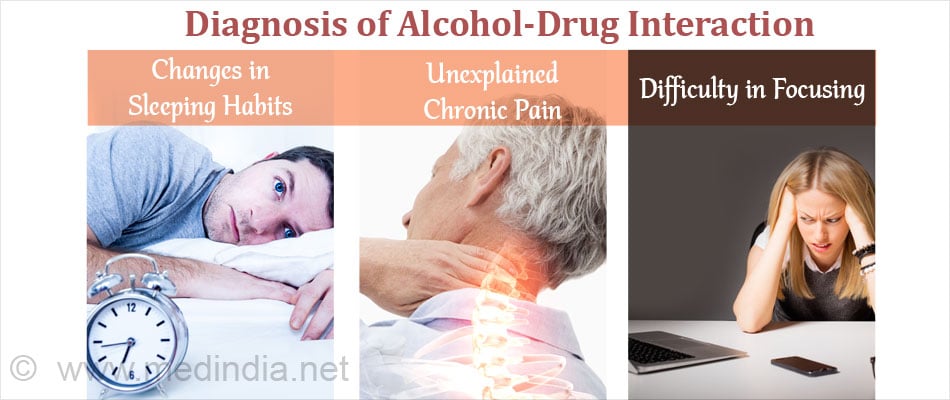
In addition, alcohol abuse and alcoholism can be diagnosed by conducting screening tests, using a type of questionnaire, to understand if patient has probability of exhibiting alcohol-drug interaction.
How to Treat Alcohol-Drug Interaction?
- Counseling: The healthcare provider must explain to the patient or alcohol addict, the impact of alcohol on the medications being consumed and what could be the potential dangers. This would help reduce or eliminate the drinking problem and thus minimize or eliminate interactions.
- Depending on the symptom(s) exhibited, the patient must consult a relevant medical specialist to cure the reaction.
What are the Preventive Methods to Avoid Alcohol-Drug Interactions?
In order to prevent any potential alcohol-drug interactions, the patient must:
- Inform doctor about all medications being consumed
- Ask the doctor if the new prescribed drug can be taken with alcohol
- Clarify if there should be a time interval between consuming medicine and alcohol
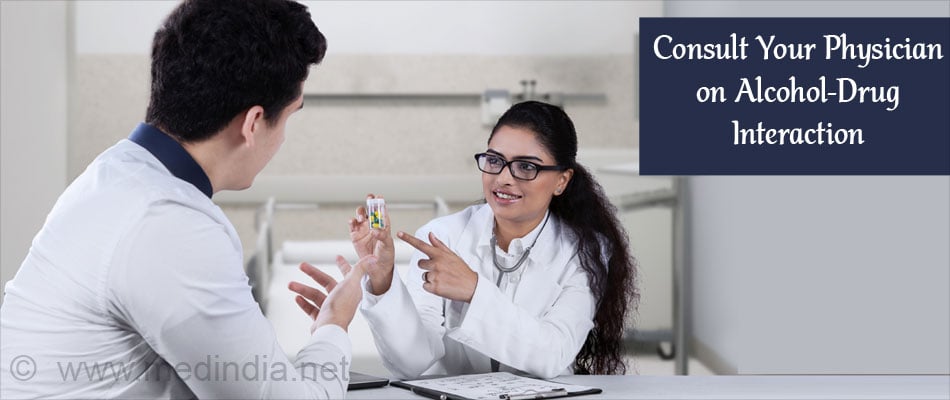
As a precautionary measure, people consuming medications must read the product warning label, for information on interactions.
Similarly, healthcare providers should be alert regarding the potential interaction between alcohol and medicaments and guide patients accordingly.
Health Tips to Avoid Alcohol-Drug Interactions
- It is important for the patient to read the prescription information, warning labels and any such instruction, accompanying the medicine pack, to understand the potential interactions between alcohol and medication.
- One must maintain a record of symptoms observed during routine consumption of medication, as well as when consuming before or after alcohol.


